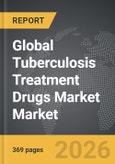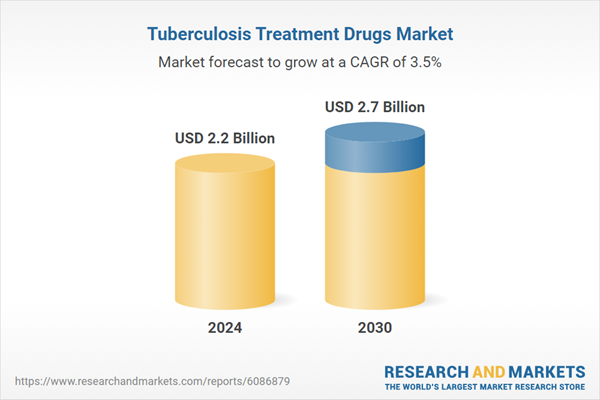Global Tuberculosis Treatment Drugs Market - Key Trends & Drivers Summarized
Why Is the Treatment of Tuberculosis Still a Global Public Health Priority?
Tuberculosis (TB) remains one of the top infectious disease killers worldwide, despite being both preventable and treatable. The ongoing prevalence of TB, especially in densely populated and low-resource regions, makes the treatment drugs market a crucial component of global health systems. Standard first-line therapy, consisting of a combination of isoniazid, rifampin, pyrazinamide, and ethambutol, has remained largely unchanged for decades, owing to its proven efficacy in drug-susceptible TB. However, challenges such as long treatment durations (typically six months), poor patient adherence, and rising rates of drug-resistant TB (DR-TB and MDR-TB) have significantly impacted treatment outcomes and public health control efforts. These factors have spurred urgent calls for the development and dissemination of shorter, safer, and more effective drug regimens. The global TB drugs market thus sits at the intersection of medical urgency and pharmaceutical innovation, with high stakes for both public health impact and commercial potential.How Are New Drug Regimens and Innovations Transforming the Treatment Landscape?
The introduction of novel TB treatment drugs and regimens is redefining therapeutic protocols, especially for drug-resistant strains. Key breakthroughs include bedaquiline, delamanid, and pretomanid, which have been incorporated into WHO-recommended regimens for MDR-TB, significantly reducing treatment duration and improving tolerability. These drugs, when used in combination with older agents, are enabling all-oral regimens that eliminate the need for painful injections and mitigate the risk of serious side effects. Additionally, research is ongoing into shorter treatment courses for drug-sensitive TB, including the promising 4-month regimen using rifapentine and moxifloxacin. Pharmaceutical companies and public health organizations are also exploring host-directed therapies and repurposing existing antibiotics to boost immune responses and shorten therapy durations. Pediatric formulations are being specially developed to improve palatability and adherence in children. Moreover, fixed-dose combination pills are gaining popularity for simplifying dosing schedules and ensuring compliance, especially in low-literacy and resource-limited settings.How Are Policy, Access, and Pricing Challenges Shaping the Market?
Despite advancements in treatment, access to effective TB drugs remains a significant barrier in many parts of the world. The cost of new drugs, supply chain complexities, and weak healthcare infrastructure limit availability, particularly in high-burden regions such as South Asia, Sub-Saharan Africa, and parts of Eastern Europe. Intellectual property rights and patent restrictions also affect the affordability of newer medications. To address these challenges, multilateral agencies such as the Global Drug Facility (GDF), the Stop TB Partnership, and UNITAID have implemented mechanisms to negotiate lower prices, support generic production, and facilitate global drug distribution. Furthermore, countries are incorporating TB treatment into universal health coverage schemes, enhancing reimbursement policies, and promoting local drug manufacturing capabilities. Regulatory harmonization efforts are accelerating drug approvals, and international collaboration is growing around clinical trials, data sharing, and pharmacovigilance. These systemic changes are gradually increasing market reach and building a more equitable treatment landscape for TB patients worldwide.What Is Fueling Market Expansion for TB Treatment Drugs Globally?
The growth in the tuberculosis treatment drugs market is driven by several factors, including the rising incidence of drug-resistant TB, increasing public and private investment in pharmaceutical R&D, and global health initiatives focused on TB eradication. The expansion of national TB control programs and the inclusion of new drugs in WHO treatment guidelines are encouraging wider adoption and market uptake. Technological advancements in diagnostic tools are also playing a role by enabling earlier and more accurate detection, thus driving timely initiation of therapy. Consumer behavior trends, including higher health-seeking behavior and better adherence support systems, are increasing treatment success rates and fueling drug demand. Moreover, pharmaceutical innovation targeting vulnerable populations - such as children, people living with HIV, and migrants - is expanding the target market. The emergence of community-based DOTS (Directly Observed Therapy, Short-Course) programs and telehealth-supported TB management models are further pushing the accessibility and distribution of medications. All these elements are contributing to a steady, long-term expansion of the global TB treatment drugs market.Report Scope
The report analyzes the Tuberculosis Treatment Drugs market, presented in terms of market value (US$). The analysis covers the key segments and geographic regions outlined below:- Segments: Disease Type (Active Tuberculosis, Latent Tuberculosis); Therapy Type (First Line Therapy, Second Line Therapy); Distribution Channel (Hospital Pharmacies, Drug Stores & Retail Pharmacies, Online Providers).
- Geographic Regions/Countries: World; United States; Canada; Japan; China; Europe (France; Germany; Italy; United Kingdom; Spain; Russia; and Rest of Europe); Asia-Pacific (Australia; India; South Korea; and Rest of Asia-Pacific); Latin America (Argentina; Brazil; Mexico; and Rest of Latin America); Middle East (Iran; Israel; Saudi Arabia; United Arab Emirates; and Rest of Middle East); and Africa.
Key Insights:
- Market Growth: Understand the significant growth trajectory of the Active Tuberculosis segment, which is expected to reach US$1.6 Billion by 2030 with a CAGR of a 2.8%. The Latent Tuberculosis segment is also set to grow at 4.7% CAGR over the analysis period.
- Regional Analysis: Gain insights into the U.S. market, valued at $586.4 Million in 2024, and China, forecasted to grow at an impressive 6.4% CAGR to reach $525.6 Million by 2030. Discover growth trends in other key regions, including Japan, Canada, Germany, and the Asia-Pacific.
Why You Should Buy This Report:
- Detailed Market Analysis: Access a thorough analysis of the Global Tuberculosis Treatment Drugs Market, covering all major geographic regions and market segments.
- Competitive Insights: Get an overview of the competitive landscape, including the market presence of major players across different geographies.
- Future Trends and Drivers: Understand the key trends and drivers shaping the future of the Global Tuberculosis Treatment Drugs Market.
- Actionable Insights: Benefit from actionable insights that can help you identify new revenue opportunities and make strategic business decisions.
Key Questions Answered:
- How is the Global Tuberculosis Treatment Drugs Market expected to evolve by 2030?
- What are the main drivers and restraints affecting the market?
- Which market segments will grow the most over the forecast period?
- How will market shares for different regions and segments change by 2030?
- Who are the leading players in the market, and what are their prospects?
Report Features:
- Comprehensive Market Data: Independent analysis of annual sales and market forecasts in US$ Million from 2024 to 2030.
- In-Depth Regional Analysis: Detailed insights into key markets, including the U.S., China, Japan, Canada, Europe, Asia-Pacific, Latin America, Middle East, and Africa.
- Company Profiles: Coverage of players such as Avis Budget Group, Big Truck Rental, Budget Truck Rental, Enterprise Truck Rental, Fluid Truck and more.
- Complimentary Updates: Receive free report updates for one year to keep you informed of the latest market developments.
Some of the 42 companies featured in this Tuberculosis Treatment Drugs market report include:
- Akorn Operating Company LLC
- ANI Pharmaceuticals Inc.
- Cadila Pharmaceuticals Ltd
- Cipla Limited
- Endo International plc
- Fresenius SE & Co. KGaA
- Hikma Pharmaceuticals PLC
- Johnson & Johnson
- LegoChem Biosciences Inc.
- Lupin Limited
- Macleods Pharmaceuticals Ltd
- Merck & Co., Inc.
- Mylan N.V. (now Viatris Inc.)
- Novartis AG
- Otsuka Pharmaceutical Co., Ltd.
- Pfizer Inc.
- Sanofi
- Sequella, Inc.
- STI Pharma LLC
- Teva Pharmaceutical Industries Ltd.
This edition integrates the latest global trade and economic shifts into comprehensive market analysis. Key updates include:
- Tariff and Trade Impact: Insights into global tariff negotiations across 180+ countries, with analysis of supply chain turbulence, sourcing disruptions, and geographic realignment. Special focus on 2025 as a pivotal year for trade tensions, including updated perspectives on the Trump-era tariffs.
- Adjusted Forecasts and Analytics: Revised global and regional market forecasts through 2030, incorporating tariff effects, economic uncertainty, and structural changes in globalization. Includes historical analysis from 2015 to 2023.
- Strategic Market Dynamics: Evaluation of revised market prospects, regional outlooks, and key economic indicators such as population and urbanization trends.
- Innovation & Technology Trends: Latest developments in product and process innovation, emerging technologies, and key industry drivers shaping the competitive landscape.
- Competitive Intelligence: Updated global market share estimates for 2025, competitive positioning of major players (Strong/Active/Niche/Trivial), and refined focus on leading global brands and core players.
- Expert Insight & Commentary: Strategic analysis from economists, trade experts, and domain specialists to contextualize market shifts and identify emerging opportunities.
Table of Contents
Companies Mentioned (Partial List)
A selection of companies mentioned in this report includes, but is not limited to:
- Akorn Operating Company LLC
- ANI Pharmaceuticals Inc.
- Cadila Pharmaceuticals Ltd
- Cipla Limited
- Endo International plc
- Fresenius SE & Co. KGaA
- Hikma Pharmaceuticals PLC
- Johnson & Johnson
- LegoChem Biosciences Inc.
- Lupin Limited
- Macleods Pharmaceuticals Ltd
- Merck & Co., Inc.
- Mylan N.V. (now Viatris Inc.)
- Novartis AG
- Otsuka Pharmaceutical Co., Ltd.
- Pfizer Inc.
- Sanofi
- Sequella, Inc.
- STI Pharma LLC
- Teva Pharmaceutical Industries Ltd.
Table Information
| Report Attribute | Details |
|---|---|
| No. of Pages | 369 |
| Published | February 2026 |
| Forecast Period | 2024 - 2030 |
| Estimated Market Value ( USD | $ 2.2 Billion |
| Forecasted Market Value ( USD | $ 2.7 Billion |
| Compound Annual Growth Rate | 3.5% |
| Regions Covered | Global |









